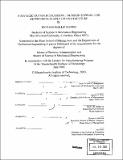Strategic outsourcing model : decision support for determining supply chain structure
Author(s)
Nardo, Richard Phillip, 1973-
DownloadFull printable version (14.06Mb)
Other Contributors
Leaders for Manufacturing Program.
Advisor
Charles H. Fine and Stanley B. Gershwin.
Terms of use
Metadata
Show full item recordAbstract
Outsourcing is becoming the norm in business today. This is a natural insight from the management philosophy of the 80's and early 90's of doing only what is "Core" to the business. A company, if their main focus is to keep their margins as high as possible, will focus on what gives their company a competitive advantage and differentiates them from the competition. To The Firm, all other tasks outside of these advantages are superfluous and unnecessary. It is only rational, in this management paradigm, to get rid of, or outsource, all of these activities that take scarce resources away from what the company considers core. The next logical question is: "How to conduct an analysis for outsourcing decision making." Current methodologies coalesce cost alternative analysis with a strategic "gut feel" from management to make decisions that will last multiple cycles into the future. Cost analysis is basic. However, strategic analysis is far reaching, impacts the company's future capabilities, and is difficult to evaluate. This thesis proposes a Decision Support System (DSS) for evaluating the strategies of outsourcing and determining the impacts on The Firm. A thorough review of industry and academic literature on outsourcing, analysis of historic outsourcing results, and discussion of current capability concerns has led to the development of six strategic factors: Customer Experience, Technical Clockspeed, Industry Climate, Supply Chain Excellence, Product Architecture, and Competitive Position. Included is an exhaustive discussion of these strategic factors, strategic matrices for evaluating the business climate, development of excel spreadsheets with questions for evaluation of these factors and matrices, development of a database for knowledge transfer, and implementation of the DSS in the organization.
Description
Thesis (S.M.)--Massachusetts Institute of Technology, Dept. of Mechanical Engineering; and, (M.B.A.)--Massachusetts Institute of Technology, Sloan School of Management; in conjunction with the Leaders for Manufacturing Program at MIT, 2003. Includes bibliographical references (p. 138).
Date issued
2003Department
Leaders for Manufacturing Program at MIT; Massachusetts Institute of Technology. Department of Mechanical Engineering; Sloan School of ManagementPublisher
Massachusetts Institute of Technology
Keywords
Mechanical Engineering., Sloan School of Management., Leaders for Manufacturing Program.